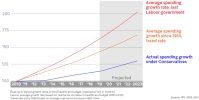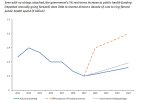And back in the real world...
NHS funding rose in real terms every year from 2007 to 2020. There were huge extra sums injected for 2020/2021, and things have now stabilised at a higher level than before.
If you are going to make arguments, at least make sure they are factual.
What is the NHS budget and how is it funded? Find out in our nutshell.

www.kingsfund.org.uk
That is why i said "real term", there was an "inflation plus" formula which was changed in 2010. so - in real terms - it's gone down compared to what it was.
So why have people so worried about the health of the NHS coffers? Part of the reason is, while the budget has continued to get bigger, funding growth has slowed considerably.
In the first 70 years of the NHS, the average annual budget rise was 3.7%. However, between 2009/10 and 2018/19, the average funding growth each year was just 1.5%.
They were forced to inject funds from 2018 onwards as they'd been several years of funding lower that what it was used to before.
You know what it's like when something well funded is less well funded? It tends to come back and bite you later.
As it has done now, even with the funding injection in 2018 - effectively things had been run down for the best part of a decade before that.
The number of ITU beds is down as a result of this - and "more treatment at home/day treatment" reforms
Here's a chart showing real term funding, as you can see it plunged since 2010

Journalists can't instigate a lockdown, so it's senseless blaming them. It's not down to that.




